|
Books Should Be Free Loyal Books Free Public Domain Audiobooks & eBook Downloads |
|
|
Books Should Be Free Loyal Books Free Public Domain Audiobooks & eBook Downloads |
|
Fiction |
|---|
|
Book type:
Sort by:
View by:
|
By: Frank Richard Stockton (1834-1902) | |
|---|---|
 The Lady, or the Tiger?
The Lady, or the Tiger?
| |
 The Magic Egg and Other Stories
The Magic Egg and Other Stories
| |
 Ting-a-ling
Ting-a-ling
| |
 The House of Martha
The House of Martha
| |
 A Jolly Fellowship
A Jolly Fellowship
| |
 The Squirrel Inn
The Squirrel Inn
| |
 John Gayther's Garden and the Stories Told Therein
John Gayther's Garden and the Stories Told Therein
| |
 What Might Have Been Expected
What Might Have Been Expected
| |
 My Terminal Moraine 1892
My Terminal Moraine 1892
| |
 Round-about Rambles
Round-about Rambles
ROUND-ABOUT RAMBLES, In Lands of FACT AND FANCYBY FRANK R STOCKTONPREFACECome along, boys and girls! We are off on our rambles. But please do not ask me where we are going. It would delay us very much if I should postpone our start until I had drawn you a map of the route, with all the stopping-places set down. We have far to go, and a great many things to see, and it may be that some of you will be very tired before we get through. If so, I shall be sorry; but it will be a comfort to think that none of us need go any farther than we choose... | |
By: Frank Stockton (1834-1902) | |
|---|---|
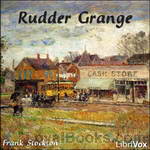 Rudder Grange
Rudder Grange
This book presents a number of short, comedic sketches of a country life in middle America in the late 1800s. The hilarious twists and turns endear our adorable, naive married couple to the reader; and the orphan servant Pomona – dear, odd, funny Pomona! – is the focus of several of the stories. Imagine a honeymoon in a lunatic asylum, and you’ve got Rudder Grange! | |
 Pomona's Travels
Pomona's Travels
Pomona and Jone of Rudder Grange fame travel to England and Scotland. Along the way, Pomona tangles with wild pigs, haymaking, hotels great and small, Pullman cars, comparison-makers, and a Duchess. She makes two matches and – in her usual, unorthodox way – stag hunts and attends a knighting. Pomona is as hilarious as ever, if a bit more rounded off on the edges. | |
By: Frank T. Bullen (1857-1915) | |
|---|---|
 The Cruise of the Cachalot Round the World After Sperm Whales
The Cruise of the Cachalot Round the World After Sperm Whales
| |
By: Frank V. Webster | |
|---|---|
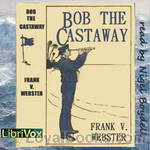 Bob the Castaway
Bob the Castaway
Frank V Webster was a pseudonym controlled by the Stratemeyer Syndicate, the first book packager of books aimed at children. This pseudonym was used on books for boys from the early 1900s through the 1930s.Bob the Castaway follows the antics of young prankster Bob Henderson, his parents futile attempts to get him to mend his ways, and his subsequent nautical adventures. (Introduction by Nigel Boydell) | |
 Bob Chester's Grit Or, From Ranch to Riches
Bob Chester's Grit Or, From Ranch to Riches
| |
 The Boys of Bellwood School
The Boys of Bellwood School
| |
 The Boy Scouts of Lenox Or The Hike Over Big Bear Mountain
The Boy Scouts of Lenox Or The Hike Over Big Bear Mountain
| |
 The Young Treasure Hunter or, Fred Stanley's Trip to Alaska
The Young Treasure Hunter or, Fred Stanley's Trip to Alaska
| |
 Darry the Life Saver Or, The Heroes of the Coast
Darry the Life Saver Or, The Heroes of the Coast
| |
 The Boy from the Ranch Or Roy Bradner's City Experiences
The Boy from the Ranch Or Roy Bradner's City Experiences
| |
 Dick the Bank Boy Or, A Missing Fortune
Dick the Bank Boy Or, A Missing Fortune
| |
By: Frank Williams (1887-?) | |
|---|---|
 The Harbor of Doubt
The Harbor of Doubt
Young Code Schofield had lost his schooner May Schofield in an Atlantic gale a few months ago, and now the townspeople on the small island of Grande Mignon off the coast of New Brunswick were beginning to talk suspiciously of the events surrounding that loss. Insurance investigators have been summoned to investigate, friends are alienating themselves from Code, and he finds himsef challenged by even those he's known and trusted his whole life. Does Code Schofield have anything to prove, and if so, to whom, and why? | |
By: Fred M. White (1859-?) | |
|---|---|
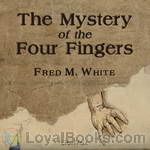 The Mystery of the Four Fingers
The Mystery of the Four Fingers
A fabulously rich gold mine in Mexico is known by the picturesque and mysterious name of The Four Fingers. It originally belonged to an Aztec tribe, and its location is known to one surviving descendant. Surprises, strange and startling, are concealed in every chapter of this completely engrossing detective story. And through it runs the thread of a curious love story. | |
 Corner House
Corner House
A deserted house with a troubled past. A mysterious countess who captivates everyone with her wealth and beauty -- well, almost everyone. An equally mysterious derelict who holds a secret to the countess's past. A fresh crime that threatens to ruin a promising young doctor. A plucky young governess determined to save him. Who will prevail? | |
By: Frederic Edward Weatherly (1848-1929) | |
|---|---|
 Wilton School or, Harry Campbell's Revenge
Wilton School or, Harry Campbell's Revenge
| |
By: Frederic Homer Balch (1861-1891) | |
|---|---|
 The Bridge of the Gods A Romance of Indian Oregon. 19th Edition.
The Bridge of the Gods A Romance of Indian Oregon. 19th Edition.
| |
By: Frederic Jesup Stimson (1855-1943) | |
|---|---|
 Pirate Gold
Pirate Gold
| |
By: Frederic Remington (1861-1909) | |
|---|---|
 Crooked Trails
Crooked Trails
| |
 The Way of an Indian
The Way of an Indian
| |
By: Frederic Stewart Isham (1866-1922) | |
|---|---|
 Under the Rose
Under the Rose
| |
 The Strollers
The Strollers
| |
By: Frederic W. Farrar (1831-1903) | |
|---|---|
 St. Winifred's, or The World of School
St. Winifred's, or The World of School
| |
 Eric, or Little by Little
Eric, or Little by Little
| |
 Eric Or, Little by Little
Eric Or, Little by Little
| |
 Julian Home
Julian Home
| |
By: Frederic W. Moorman (1872-1919) | |
|---|---|
 Tales of the Ridings
Tales of the Ridings
| |
 More Tales of the Ridings
More Tales of the Ridings
| |
By: Frederica J. Turle | |
|---|---|
 The Gap in the Fence
The Gap in the Fence
| |
By: Frederick Carruthers Cornell (1867-1921) | |
|---|---|
 A Rip Van Winkle Of The Kalahari And Other Tales of South-West Africa
A Rip Van Winkle Of The Kalahari And Other Tales of South-West Africa
| |
By: Frederick Ferdinand Moore (1877-) | |
|---|---|
 Isle o' Dreams
Isle o' Dreams
| |
 The Devil's Admiral
The Devil's Admiral
| |
By: Frederick Marryat (1792-1848) | |
|---|---|
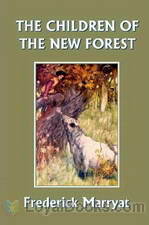 The Children of the New Forest
The Children of the New Forest
The children of Colonel Beverley, a Cavalier officer killed at the Battle of Naseby are believed to have died in the flames when their house, Arnwood, is burned by Roundhead soldiers. However, they escape and are raised by Joseph Armitage, a gamekeeper in his cottage in the New Forest. The story describes how the children adapt from anaristocratic lifestyle to that of simple cottagers. The children are concealed as the grandchildren of Armitage. Eventually after Armitage’s death, Edward Beverley leaves and works as a secretary for the sympathetic Puritan placed in charge of the Royal land in the New Forest... | |
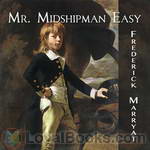 Mr. Midshipman Easy
Mr. Midshipman Easy
One of the first novel-length pieces of nautical fiction, MR. MIDSHIPMAN EASY (1836) is a funny and easygoing account of the adventures of Jack Easy, a son of privilege who joins the Royal Navy. The work begins as a satire on Jack’s attachment to “the rights of man” that may try the listener’s patience. But despair not, for the story soon settles down as the philosophical midshipman begins his many triumphs over bullies, foul weather, and various damned foreigners of murderous intent.Caveat audiens: This novel employs racial/ethnic epithets and religious stereotypes, as well as taking a rather sunny view of supply-side economics... | |
 The Phantom Ship
The Phantom Ship
| |
 The Settlers in Canada
The Settlers in Canada
| |
 The Pirate
The Pirate
| |
 The King's Own
The King's Own
| |
 Masterman Ready The Wreck of the "Pacific"
Masterman Ready The Wreck of the "Pacific"
| |
 The Phantom Ship
The Phantom Ship
| |
 The Privateersman
The Privateersman
| |
 Jacob Faithful
Jacob Faithful
Rebelling against the career chosen for him by his wealthy family, Frederic Marryat joined the Royal Navy in 1806 at the age of 14. He first served as a midshipman in the 38-gun frigate "HMS Imperieuse" commanded by Lord Cochran, 10th Earl of Dundonald whose real life exploits were used by Marryat in his fiction and which formed the basis for other famous fictional characters like Horatio Hornblower and Jack Aubrey. Having survived more than 50 sea battles and attained the rank of Post Captain, he resigned from the Navy and devoted the rest of his life to writing, drawing a good deal on his distinguished career in the Navy and is now considered the Father of Modern Nautical Fiction... | |
 The Mission; or Scenes in Africa
The Mission; or Scenes in Africa
| |
 Poor Jack
Poor Jack
| |
 Poor Jack
Poor Jack
| |
 Frank Mildmay Or, the Naval Officer
Frank Mildmay Or, the Naval Officer
| |
 Travels and Adventures of Monsieur Violet
Travels and Adventures of Monsieur Violet
| |
 Snarleyyow
Snarleyyow
This is a quite amusing nautical tale of the British Navy of the around the year 1700. While, as with much early 'humor', it is somewhat heavy-handed, the sympathies of the author are clear and good, and cruelty is often averted by good fortune or background characters. First published under the title 'The Dog Fiend', the primary characters are an evil captain of a cutter and his dog. The dog seems indestructible, as is the poor cabin boy who is the butt of the captain's ill humor, and who often is chewed on by the dog... | |
 Masterman Ready
Masterman Ready
| |
 Valerie
Valerie
| |
 The Travels and Adventures of Monsieur Violet in California, Sonora, and Western Texas
The Travels and Adventures of Monsieur Violet in California, Sonora, and Western Texas
| |